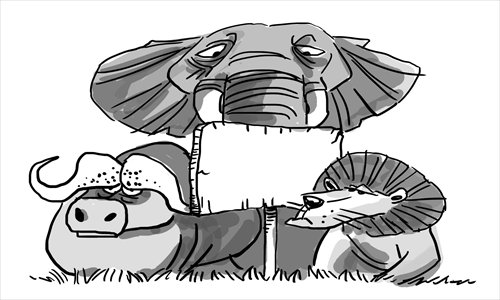Time to take African eco-concerns seriously

Africa's growth engine has been roaring for some time now. The recent global financial crunch could not stop it. This puzzled many, including the World Bank and the International Monetary Fund.
The argument was that Africa is too loosely attached to global economies to feel the heat of the crisis. However, a closer evaluation showed the continent had erected strong firewalls against such risks. This set the pace for economic autonomy in the continent.
Africa is strengthening its governance structures, while security is now a priority for many nations. In addition, it has heavily invested in infrastructure. Massive repairs and expansions are ongoing. The roads have connected African nations, accelerating intra-African trade. This kind of trade stands to make the continent's industries more competitive.
The continent's current internal trade, however, is about 10 percent of its total trade. Most of Africa's exports go to advanced economies such as Asia, Europe and the US. Its imports, whose value has always been higher than those of exports, come from these regions, too.
China has stepped in during this process. The economic tiger is transforming Africa's investment landscape. It has invested billions of dollars in infrastructure. The once impassable roads are now key routes to marketplaces.
Beijing is also putting up hundreds of hydropower projects. These will check intermittent and costly energy supplies.
In Sudan, it has installed a 1,250-megawatt plant. The 174-kilometer reservoir is the country's largest. However, it displaced more than 50,000 people from the fertile Nile Valley.
Perhaps Ethiopia is the biggest beneficiary of China's hydropower investments. However, it could also be the biggest casualty. Gibe III is Africa's largest hydropower project. It is being funded and built by China. The completion of the $1.7-billion dam will affect more than 500,000 people in Kenya and Ethiopia. It will also, in the first five years, reduce Lake Turkana's water levels by 33 feet.
In Ghana, the Asian economic tiger is building the Bui Dam project. Environmentalists say the project, which is 70 percent complete, has interfered with the habitat of some rare breeds of hippopotamus. It also displaced 2,600 families.
These projects depict the dilemma facing Chinese investments in Africa. Chinese firms are known for breaking new ground, making previously inaccessible resources available. They are developing projects in remote and ecologically fragile zones. This strategy compounds the environmental risks inherent in most of its projects.
It is more of a challenge to Africa as the Asian nation seeks to boost the continent's investment profile.
Approximately 1.4 billion people lack access to electricity globally, and 1 billion more have unreliable electricity access. The energy problem, coupled with the poor roads, continue to impair attainment of the Millennium Development Goals in Africa. An underperforming energy system results in a loss of about 2 percent of annual economic growth potential. Of the $40 billion needed until 2030 to achieve universal energy access, only about 5 percent of this amount is expected through traditional development partners.
China's energy and road investments around the continent could bring this goal into reach. It is therefore almost impossible to think of Africa's future without China. The foundation put up for growth should inevitably be maintained and hastened. However, at what point do economic needs supersede environmental issues?
Every time environmental issues in Africa are discussed, fingers are pointed at China. Activists have been at the forefront of opposing China's phenomenal development in Africa, which they allege has come at the expense of the environment.
It is imperative to note that in a globalizing world, environmental issues are now multinational. The need to boost economic growth and promote development in Africa is essential. But it can't come at the expense of its environmental resources. China's commercial interests on the continent should take cognizance of the ecosystem.
It is of critical importance that China start setting high benchmarks and make its resource extraction in Africa a model for cooperation and mutual advantage.
Environmental concerns should also be integrated into the mainstream of China's political and economic relations with Africa.
It is probably time the Beijing Action Plan of 2007-2009 deliberations were adhered to. The document committed to the recognition of the importance of environmental protection for achieving sustainable development, creation of the UNEP China-Africa Environmental Center and promotion of exchanges in environmental protection.
This will bring to a stop the many questions posed about Beijing's recent upsurge of interest in Africa.
The author is a journalist on African issues based in Nairobi, Kenya. mkapchanga@gmail.com